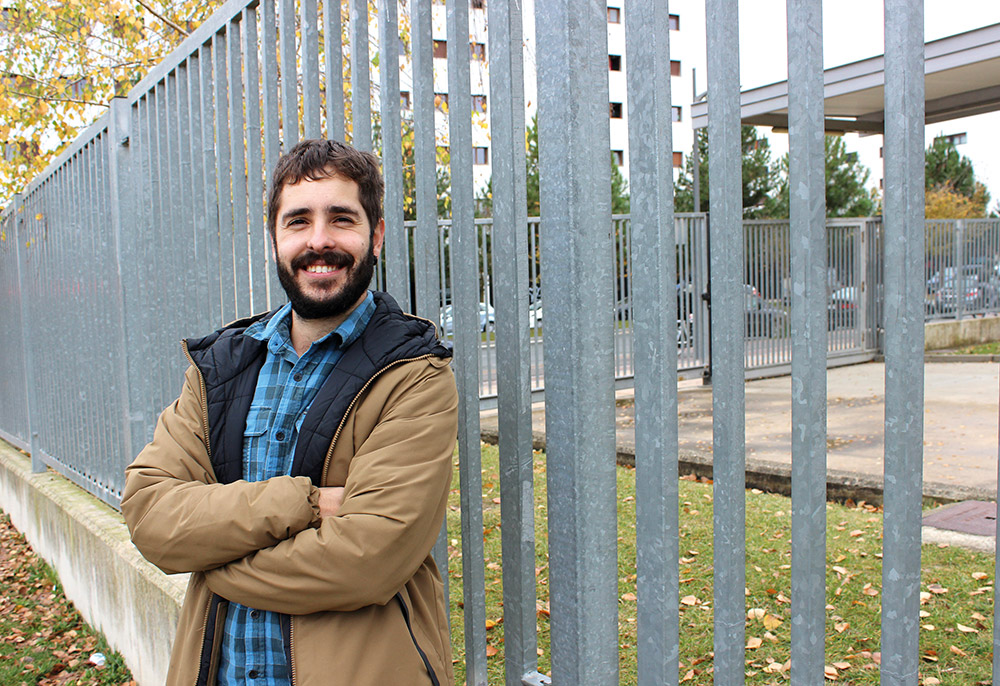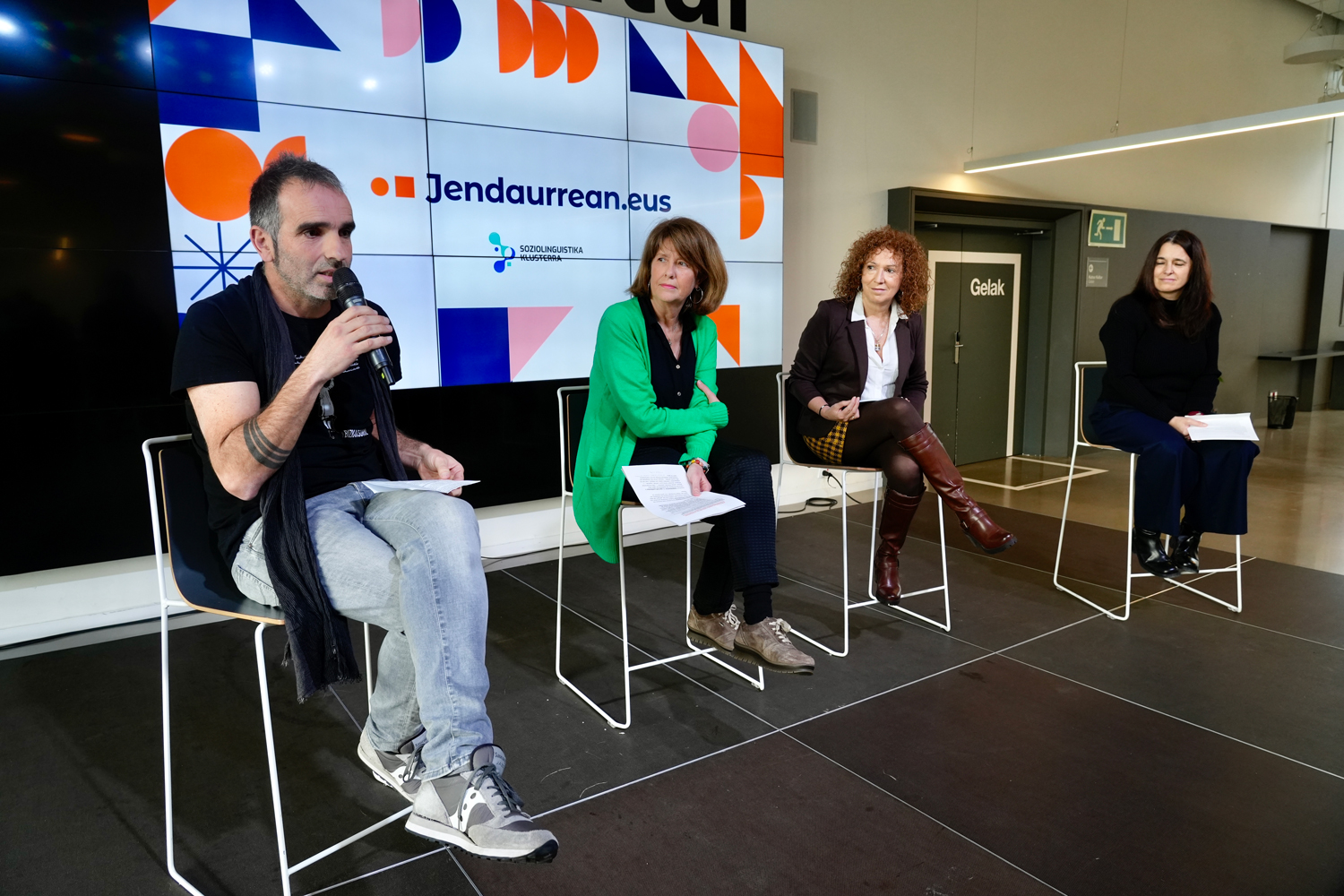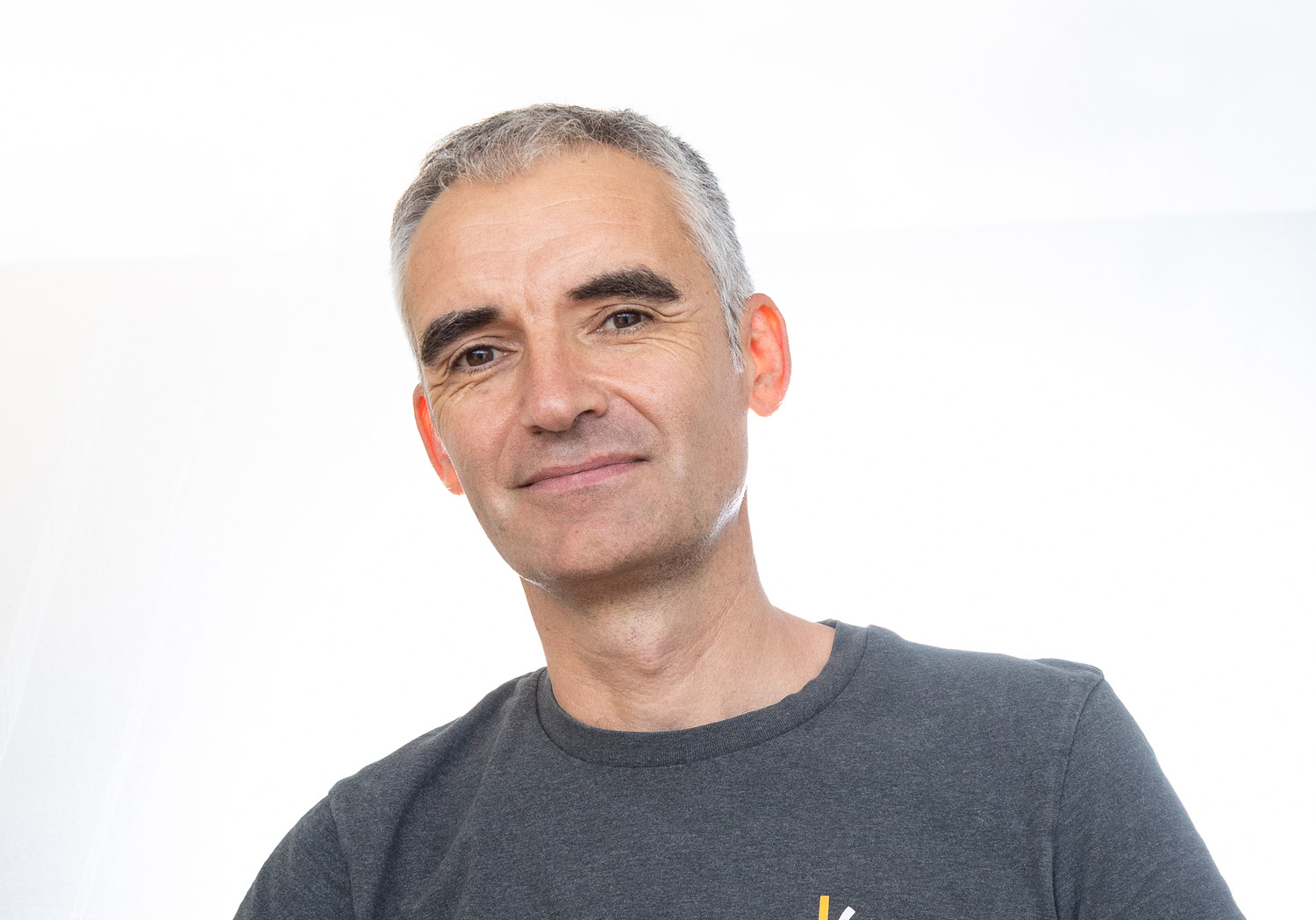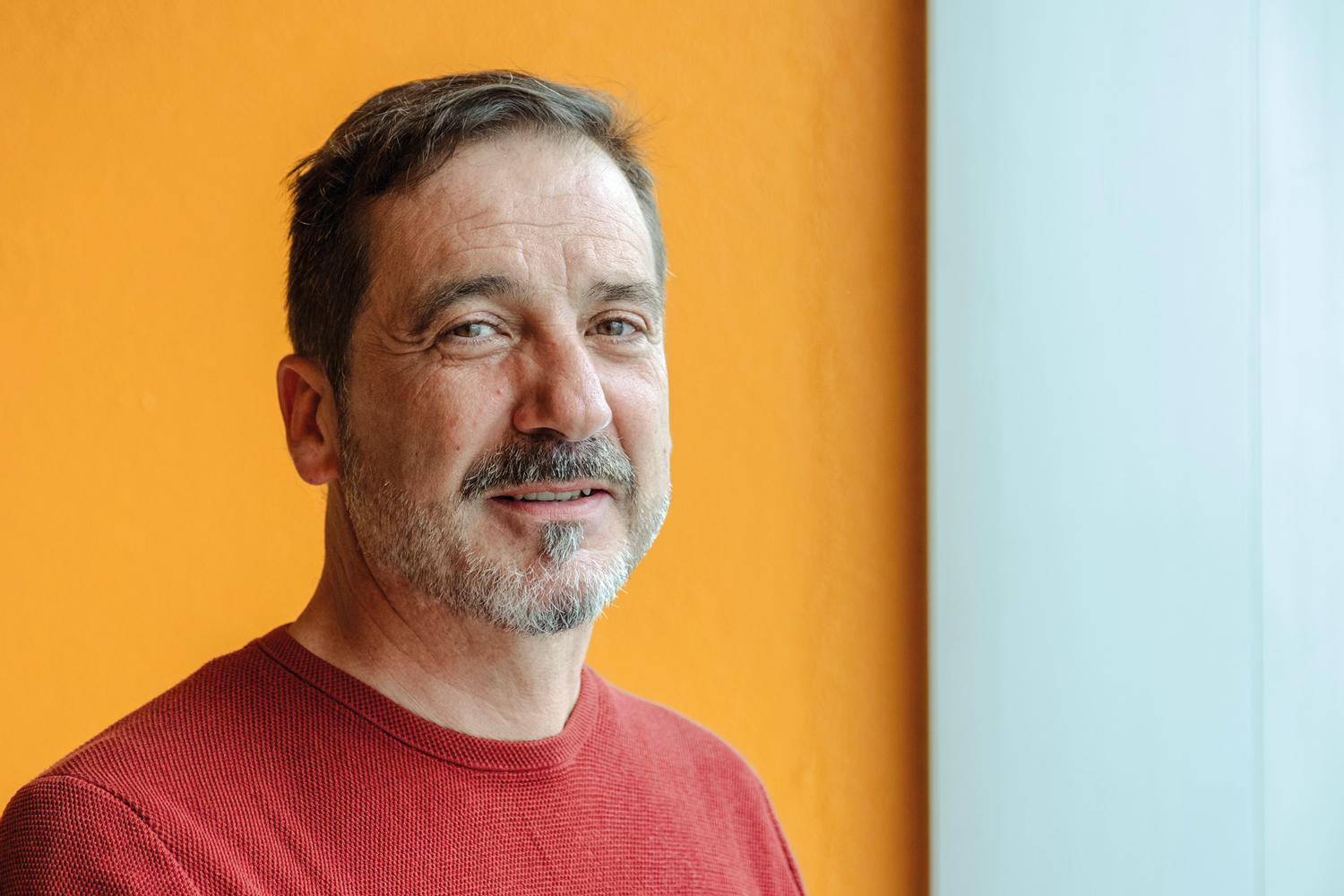"We want Euskaldunes boys and girls to be mixed with Castilian speakers, but with Euskera as the axis"
- This interview is part of the report published on October 31 in ARGIA: Children who have Euskera from home in the same class or scattered? The article collected several statements from Mitxel Elortza (Vitoria, 1988). Mr Elorza, the spokesman for the Arnasa group, wanted to give wider explanations in this regard. We will be asking that Euskaldunes children should not be dispersed in classrooms.

We will respect the group, we only know that you are supporters of the Basque children meeting in the same classroom…
Izan, Arnasa is a group of vasophilic parents. The participants live in Castilian speaking municipalities of the Basque Country and our children are learning in model D. They're vasco-speakers, they're minorities in the classroom, but in most centers, instead of putting them together, they scatter them into classrooms. The presence of Castilian and Spanish children makes it difficult to use Euskera, while the dispersion makes it impossible for our children to speak in Euskera. Our Basque speaking children are radically denied the possibility of expressing themselves in Euskera, even if it is in model D! The conclusion is that our boys and girls are completely away from Castilian, even in a very short time!, who leave Euskera, both in school and outside of it. The need to find a solution to this serious problem brought together several parents at the Women's House.
This year you were also worried before the summer, as you wrote here or there.
In June, we contacted parents who shared concerns. We met on social media and decided to hold a video call meeting. It was the origin of the Let's Breathe group. Since then, we have extended the issue to society and have tried to integrate the families that are in the same situation in Euskal Herria. We claim the right of our sons and daughters to live also in Basque at school, and for this we consider essential the existence of functional respiratory spaces that allow the development in Basque. Moreover, seeing that in many centers of model D the main language of relationship is also Spanish. We therefore call for the children who bring Euskera from home not to be dispersed, for they will only be able to speak in Euskera if they are together. The dispersion makes no sense: it prevents them from expressing themselves in Basque among them and, on the other hand, it does nothing to the children of Erdaldunes. If everyone speaks Spanish, where are the benefits?
“Arnasa Dezagun does not call for the distribution of Basque children and children, but for the dispersal of Basque children”
Above all, it is demanded that children who come from home in Euskera not be dispersed.
D. D. Arnasa does not call for the distribution of Basque children and children, but for the dispersal of Basque children. In other words, we do not want to see “Euskaldunes”, but rather to ensure that there is sufficient critical mass of Basques, at least where possible. And that, at least in one of the classrooms, the Basque language is the main relationship language of these students, and for the boys and girls of the other classes of models and bridges. Vasco-speaking boys and girls can live with Castilian parasols in the classroom, but without being dispersed by them. We consider it essential to do so in this way, if at some point Euskera is to become the main language of the classrooms and the center. As a result of the dispersion, Euskaldunes students have no choice but to leave Euskera and dedicate themselves to Spanish. On the one hand, because of the fear of integration problems caused by the non-use of Spanish, and on the other, because of the pressures of the rest of the children. In this sense, they tend to develop disappointing experiences and beliefs related to the Basque country. This calls into question not only the current use, but also the transmission of tomorrow. It is therefore urgent to put an end to this situation.
Not dispersing Vasco-speaking children, does it mean abandoning Erdaldunes children?
Our desire is to Euskaldunize all the children of the center. In the case of Euskaldunes students, special attention will have to be paid to the children who have the Spanish house. On the one hand, we will offer the indispensable model of fellow Vasco-speakers who have the habit of expressing themselves in Euskera—and without shame, pride—what is known as the motor effect and antenna. On the other hand, resources and specialised aid will have to be allocated to Castilian and Spanish children. The linguistic relations established in childhood are more difficult to change in the future and it is very important that the relations be channeled as soon as possible in Euskera, as early as possible. And there's diversity and inclusion. There, the Basque country should be a fundamental role, but it does not. Our proposal also aims to address these issues, always focusing on the Basque language and closing the way to the stigmatization of the respiratory spaces. We propose that children who do not have a Spanish or French mother tongue in the Northern Basque Country should be included in these functional respiratory areas. We believe it can be a good way to contribute to the integration of this student body through our language.
How to determine who the Basque children are, that is, the Vasco-speakers?
When distributing Euskaldunes students in different classrooms, those in charge of the centers have no doubt about who the Vasco-speakers are. Apparently, linguistic practices in the family sphere have been the criterion used so far to make the distribution: if the child brings the Basque house, disperse it. We believe that the same criterion should serve to group Basque boys and girls. In addition, boys and girls who come from an erdaldun context, but who still show a desire or tendency to do so in Euskera, should be part of the Euskaldunes group. Direct observation within the classroom can be a good tool to perform this classification.
“Our Vasco-speaking boys and girls are profoundly denied the possibility of speaking in Basque”
Is it enough for Euskaldunes to meet without further ado in the same room, or is another intervention needed?
It is not enough, far from it, but it is fundamental. It is certainly necessary to carry out other interventions both inside and outside the center. Inside the school, especially, but not only, in the classrooms where there is no Euskaldunes. Outside the center, in EiTB and on all screens, in after-school activities, in parents' attitudes and practices, in the linguistic landscape, in the different care services, in the supply of products in Euskera, etc. Before and during groupings, the most appropriate measures to be implemented will have to be analysed in each case. In classrooms where there are no Basque children, multiple interventions could be made, use of reinforcements, duplicate, direct the most experienced teachers... The distribution of resources according to needs will improve the results.
It says “Attitude and practices of parents.” What do you ask of the Basque parents?
We believe that the involvement of vasco-speaking members of each community can be very beneficial. Basque parents should participate directly in the classrooms, in the Castellanoparlantes room, as well as in after-school activities. The most effective would be the implementation of popular projects, with the direct participation of as many entities and agents of the municipality and the neighborhood as possible. All this requires a foundation: the Basque speaking collective; in the case of the centres, the collective is that of the Basque children. The realisation of our proposal could, in its simplicity, be the first step in favour of deeper and daring changes.
What have been the obstacles you have encountered on the road to Respiro so far? There are also opposing views.
Since the launch of the initiative, we have heard some opposing views, yes, but many more have been the explicit accessions and supports we have received. However, criticism is legitimate and necessary, insofar as it is honest and constructive, and we have received interesting contributions from some who have shown a critical view. However, the biggest obstacle has been the closed attitude of the centres. However, we have still received an invitation today from the Ikastolas Confederation to discuss the matter. It may be the first step towards redirecting the conflict and starting on the right track. We shall be attending the meeting with hope.
“Boys and girls who come from an erdaldun context but who want to express themselves in Basque should also be integrated into the group of Euskaldunes”
Have you had support?
[The Arnasa manifesto was presented in Bilbao on 27 November. In addition to making public the existing list of accessions, they announced a protection campaign open to all citizens.] Our demand includes many different opinions, expressions of solidarity and accessions. We have received the support of almost 100 teachers, and dozens of well-known Euskaltzales have joined our initiative: they are experts in sociolinguistics, journalists, artists, athletes, musicians, writers, bertsolaris… We have also received the support and recognition of many fathers and mothers, who have been fully identified with the initiative, and some have the pity because it has been launched late, because at the time of their children it had not been done. It is clear that we have put a fundamental issue on the table, and it can be said that we have connected with what many Basques feel. On 27 November we will present the Arnasa manifesto in Bilbao. In it, in addition to making public the existing list of accessions, we will announce a campaign of protection open to all citizens.
We are talking about adapting in the same group the children who have Basque from home. However, this is a “sensitive issue.”
Yes, no doubt. That is why we have called for the Basque children not to be dispersed. Because the groupings have to be very carefully and with a great deal of care, in order to take care of the linguistic rights of Basque children — and their families — and in order to facilitate the process of learning of Castilian parishioners from home, also for the benefit of their families. We believe it is essential to take into account the opinion of the management of each center, of the teachers and of the parents. That is why we are calling for calm, objective and unmanipulated reflection on this issue. That is why, before we do anything, we go to experts to get a qualified opinion on our proposal. And we insist again: what we are asking is that Basque boys and girls do not disperse, we are not asking for them to be separated from others. We want boys and girls from Euskaldunes to interact and mingle with Castilian speakers, but with Euskera as an axis, and not as it happens in most days, only in Spanish.
Studies
“It is not for Arnasa Dezagun to answer the question of whether there are studies, they are not, but they defend the dispersion of the Basque children. What studies have been based on to promote dispersion? What are the consequences of this policy? Where are the data collections, analyses and reflections of this practice carried out during these two decades? We have often heard and read, especially from the world of Basque culture, that the Basque community must be compacted if the Basque community is to make progress. Should we exclude school from this need for compaction? How do those who are in favour of the consolidation of the Basques explain, but against the Let's Breathe proposal?
According to the diagnostic evaluations carried out every two years by the Department of Education of the Basque Government, the capacities and use of the Basque Country have steadily worsened in model D, in the years 2011, 2013, 2015, 2017 and even 2019. This is what the studies say. Isn’t it time to start turning the decline around?” (Mitxel Elortza, spokesman for Arnasa Celeb).
Plazara, AEK, Uda Leku, Dindaia eta Ebete antolakundeak Baionan elkartu dira Famili'on egonaldi ibiltariaren lehen edizioa aurkezteko. Hizkuntza mailaren arabera eskaintza bat edo beste egongo da eta haur zein gurasoentzat izango da udaberrian.
I think it will have to do with the hangover of the profession, but I have to acknowledge that I look at the linguistic landscape of the places I visit. Signs that stick on the walls, hanging from streetlights, billboards, and supports that appear in shops or companies (signs,... [+]
























